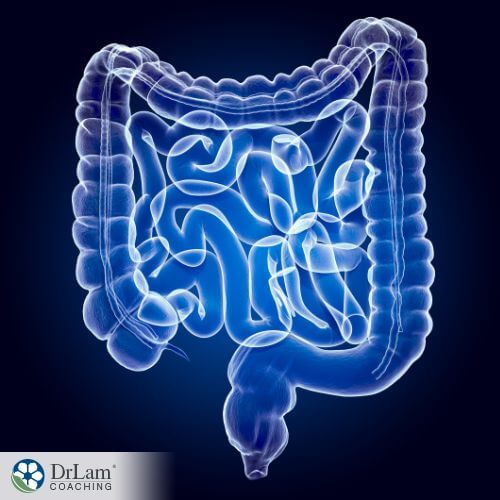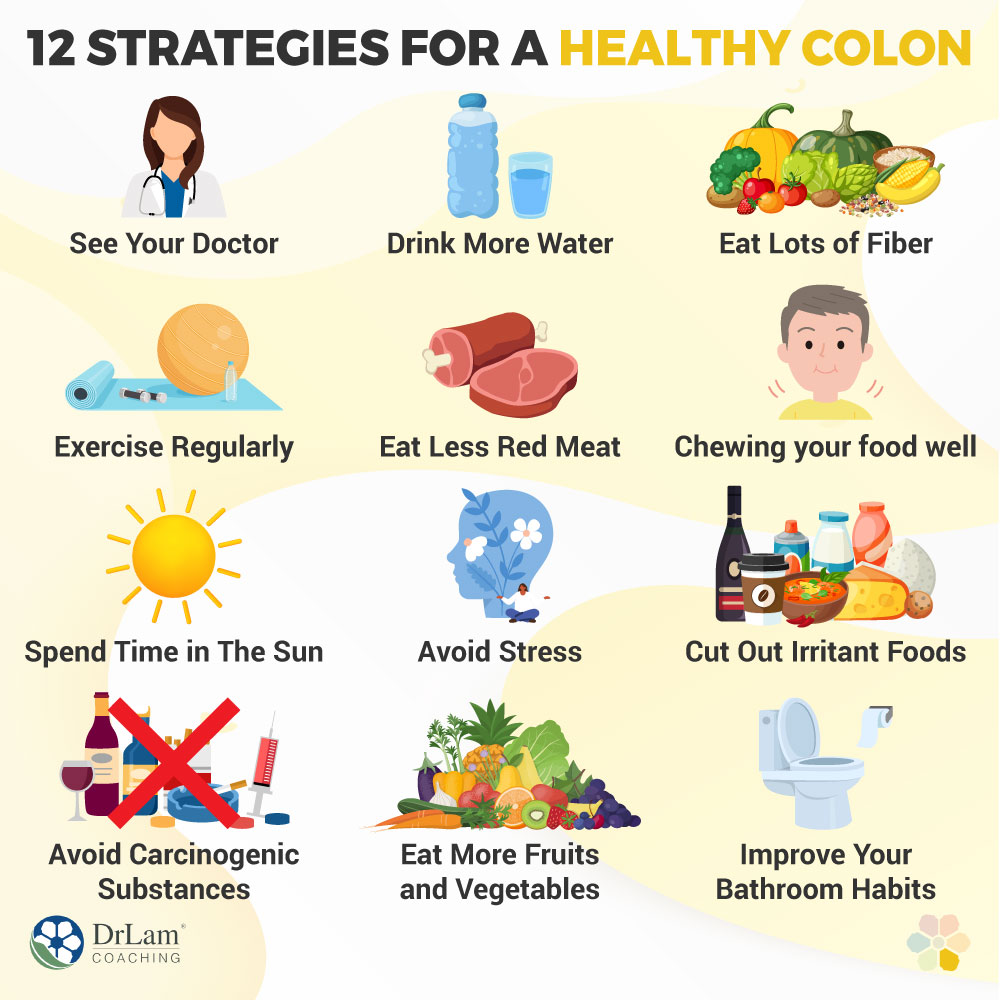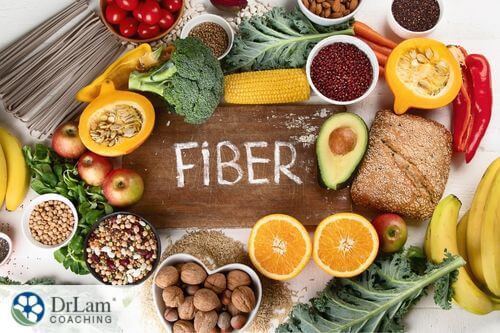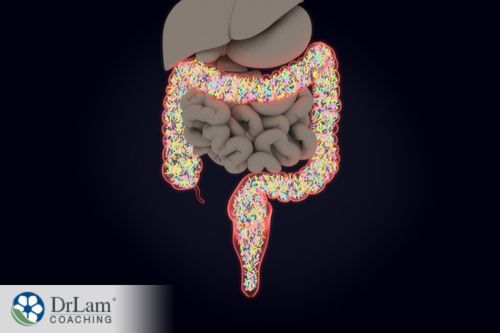 A healthy colon is absolutely essential for the health of the rest of your body, yet it’s often overlooked. Your colon performs a number of essential functions in your body, and when it’s unhealthy, the results can be catastrophic. In addition, colon cancer is one of the most common forms of cancer in the US. Colon cancer is also one of the most common causes of cancer death in America.
A healthy colon is absolutely essential for the health of the rest of your body, yet it’s often overlooked. Your colon performs a number of essential functions in your body, and when it’s unhealthy, the results can be catastrophic. In addition, colon cancer is one of the most common forms of cancer in the US. Colon cancer is also one of the most common causes of cancer death in America.
Improving the health of your colon isn’t difficult and it can pay huge rewards for your overall health. With that in mind, here are some easy ways to improve the health of your colon.
The longest part of your large intestine is also known as the colon. It joins with the anus at one end and the small intestine at the other and is part of the digestive tract. The colon also performs a number of essential functions in the body. A healthy colon:
Colon cleanses have been around for centuries but have also been gaining in popularity. There are two main ways to do a cleanse. The first is performed by a doctor and involves inserting water into the rectum to flush out the colon. Or you can buy at-home kits that contain teas, enemas, laxatives, or enzymes that do the same thing.
According to some people, this process can help to flush out toxins and undigested foods that build up in the colon. However, there is no evidence that colon cleanses will help to improve the health of your body or of your colon. Your body has natural processes that can expel toxins and doesn’t need the help as long as it’s relatively healthy. A colon cleanse also increases your risk of:
Some of these risks can be very serious. So, if you’re thinking of getting a colon cleanse, talk to your doctor first. Also, always go to a licensed professional, as every state in the US has different rules and regulations surrounding this practice.

Supporting and maintaining a healthy colon actually isn’t difficult. It just takes a few simple lifestyle changes that you should be making anyway. Here’s how to make your colon healthier day by day:
If you have a family history of colorectal cancer, then talk to your doctor about regular colonoscopies. Otherwise, you should start having regular screenings at around 50. Colon cancer is a common but often missed form of cancer that can be life-threatening if not addressed early, so don’t skip this step.
Drinking more water will help to make your colon healthier in a number of ways. It will help your colon:
 You should be eating between 28 and 34 grams of fiber every day and yet only around 5% of Americans eat this much. Fiber keeps your heart and your colon healthy. It also helps to speed up bowel movements for better toxin removal. Here are some ideas for eating more fiber:
You should be eating between 28 and 34 grams of fiber every day and yet only around 5% of Americans eat this much. Fiber keeps your heart and your colon healthy. It also helps to speed up bowel movements for better toxin removal. Here are some ideas for eating more fiber:
If you’re able to exercise, then it may help improve your digestive system and reduce the symptoms and risks of gastrointestinal diseases like constipation, cancer, and irritable bowel syndrome. Just be careful when you exercise as it can cause nausea or heartburn if you’re not used to it. If you’re concerned, see your doctor before starting an exercise program.
Studies have shown that there’s a link between eating lots of meat and colon cancer. This doesn’t mean that you should eliminate red meat entirely from your diet, but try reducing the amount of red meat by replacing it with chicken or fish to get some variety. You should also try to eat a meat-free meal every now and then.
If you’re always eating when you’re rushed or stressed, then you probably aren’t chewing properly. Chewing your food well helps support a healthy digestive system and colon, so work on chewing every bite 30 times before swallowing. Chewing also allows the enzymes to help digest food better.
There are certain substances that are strongly associated with colon cancer and should be reduced or avoided altogether. Some of these harmful substances are:
Talk to your doctor if you have a problem with any of these before it affects the health of your colon.
Fruits and vegetables contain antioxidants and nutrients that are linked to a lower risk of colon cancer. They will also help you maintain a healthy body weight and contain lots of fiber, all of which will help keep your colon healthy.
The fear of skin cancer has led to people spending all their time inside or wearing sunscreen when they’re outside. This obviously is good for your skin, but it isn’t as good for your colon or other parts of your body.
When you’re exposed to sunlight, your skin produces vitamin D, which is essential for a healthy colon. And you really don’t have to get a lot of sun to experience these effects. Just try to spend around 20 minutes in the sun every day and you’ll notice a difference. If that isn’t possible, there are certain foods that contain vitamin D such as:
You can also take supplements to increase your vitamin D intake.
 It seems obvious, but your bathroom habits are pivotal to the health of your colon. Some easy ideas for improving your habits in this area are:
It seems obvious, but your bathroom habits are pivotal to the health of your colon. Some easy ideas for improving your habits in this area are:
There are certain foods and drinks that can irritate your stomach and your digestive system, affecting the health of your colon. This can cause too-hard or too-soft bowel movements as well. Some foods to cut out are:
Your stomach is unique and may react differently to different foods. So, try cutting these foods out and adding them back in slowly, to see how each one affects your stomach and your colon.
Stress, particularly ongoing stress, can negatively impact every part of your body, including your colon. In terms of colon health, stress will upset your digestive system, which will directly impact colon health. If you’re frequently stressed, then find ways to relieve or reduce your stress. Some helpful strategies for this are:
Try a few strategies and see how they work for you.
Stress is dangerous for more than your colon. Stress forces the release of cortisol from your adrenal glands as part of the NeuroEndoMetabolic (NEM) stress response. Cortisol helps your body survive stress and helps prevent you from becoming damaged. But this NEM stress response is supposed to be a short-term solution. When stress becomes chronic and ongoing, the NEM stress response must remain active over the long term. As a result, the adrenal glands can become fatigued. This is a condition known as Adrenal Fatigue Syndrome (AFS).
The body’s circuits can also be negatively affected by the ongoing high levels of cortisol. These circuits are part of the NEM stress response, and each contains three organs and systems that work together to resolve stress. The ongoing high levels of cortisol can upset the delicate balance of these circuits, causing a range of symptoms and disorders.
Stress can turn a healthy colon into one that’s unhealthy and malfunctioning. This stress can exacerbate or bring on AFS and circuit imbalances. An unhealthy colon will also impact the body’s ability to rid itself of toxins, which will directly contribute to high inflammation levels and imbalances in the Inflammation Circuit.
One of the most important duties of a healthy colon is to help with expelling toxins. These toxins can otherwise build up in your body and flow back into the bloodstream from the digestive system. When this occurs, it will directly impact the Inflammation Circuit.
 The Inflammation Circuit consists of your microbiome (or the balance of bacteria in your body), your immune system, and your gut. This circuit activates automatically to address stress, increasing inflammation levels in order to help protect your body from damage. When you have AFS and this circuit is unbalanced, inflammation becomes chronic. This can be very dangerous, as chronic inflammation has been linked with heart disease, cancer, and a range of other health threats.
The Inflammation Circuit consists of your microbiome (or the balance of bacteria in your body), your immune system, and your gut. This circuit activates automatically to address stress, increasing inflammation levels in order to help protect your body from damage. When you have AFS and this circuit is unbalanced, inflammation becomes chronic. This can be very dangerous, as chronic inflammation has been linked with heart disease, cancer, and a range of other health threats.
The three components in this circuit are connected, so as one declines in health and functioning, the others follow. This can create a downward spiral of poor health and malfunction which can be dangerous.
An unhealthy colon will directly impact the health of this circuit. Here’s how:
The colon is part of the gut, so will directly impact its health and functioning. An unhealthy colon will contribute to any gut problems that occur as the Inflammation Circuit becomes unbalanced. And the opposite is also true, with imbalances in the gut directly causing colon problems. This can result in a build-up of toxins in the body.
The microbiome exists in a careful balance between good and bad bacteria. When the colon is healthy, the resulting higher levels of toxins will change this balance, often skewing it towards unhealthy bacteria. This can cause infections, bacterial overgrowth, and even a leaky gut, which will compound the original problem.
As gut health declines, toxin levels increase, and bad bacteria flourishes, the immune system will create more inflammation in order to fight these threats. When you have AFS, this will not only increase general inflammation levels in your body, but it will put more stress on your already overworked immune system, causing further malfunctions and imbalances. This can, in some cases, lead to an increase in allergies, sensitivities, and auto-immune conditions.
A healthy colon probably isn’t at the top of your list when you think about improving your health. And yet if your colon is unhealthy, you will suffer from a range of increasingly serious symptoms and health issues. Here are some easy, simple ideas that will make a big difference to the health of your colon:
For more info on lifestyle changes that will improve your health, talk to our team at +1 (626) 571-1234 or click here.
Your colon is an often-ignored organ and yet a healthy colon is absolutely essential for the health of your body. When your colon is healthy, it will help support healthy digestion and elimination and help your body clear itself of nasty toxins.
